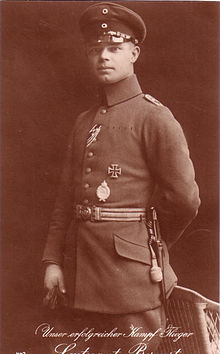Fritz Otto Bernert
| Otto Bernert | |
|---|---|
 |
|
| Born | 6 March 1893 Ratibor, Upper Silesia German Empire (modern Raciborz, Poland) |
| Died | 18 October 1918 (aged 25) Ratibor, Upper Silesia |
| Jerusalem Cemetery | Ratibor, Upper Silesia |
| Allegiance | German Empire |
| Service/branch | Infantry, Air Service |
| Years of service | 1912 – 1918 |
| Rank | Oberleutnant |
| Unit | 173rd Infantry Regiment, FA 27, FA 71, KEK Vaux, Jagdstaffel 4, Jagdstaffel 2 |
| Commands held | Jagdstaffel 2 |
| Awards |
Pour le Merite Iron Cross |
Oberleutnant Fritz Otto Bernert (6 March 1893 – 18 October 1918) was a leading German fighter ace of World War I. He scored 27 victories despite being essentially one-armed.
Fritz Otto Bernert was the son of a Bürgermeister (mayor). He was born in Ratibor, Silesia, which now is Racibórz, Poland. At the time of his birth, Ratibor was German and part of the Kingdom of Prussia.
Bernert was commissioned into the 173rd Infantry Regiment in 1912. He was serving with them when World War I began. He was wounded in ground combat in both November and December 1914; his fourth wound, inflicted by a bayonet, severed the major nerve in his left arm. Upon recovery, it became apparent his left arm was essentially useless, and he was invalided out of the infantry.
"Otto" Bernert then applied to the Luftstreitkräfte and trained to be an aerial observer. Upon graduation, he flew reconnaissance missions for Feldflieger Abteilung 27 from February through July 1915. He then transferred to FFA 71, where he served through November. He then applied for pilot's training; he hid his disability successfully and was accepted. The fact that he wore glasses also did not bar him from service.
He transferred to Kampfeinsitzerkommando Metz, a temporary grouping of pilots mostly from FFA 71, for his initial assignment to a fighter unit. By March, 1916, he had his pilot's license and was assigned to KEK Vaux. On 17 April 1916, he scored his first victory while flying a Fokker Eindecker, over a Nieuport fighter.
Because KEK Vaux was an ad hoc fighter unit, it was equipped with Halberstadt D.II planes and reorganized into a full-fledged Prussian fighter squadron. It became Jagdstaffel 4 on 25 August 1916. On 6 September, Bernert scored the new squadron's first victory. He became an ace on 9 November 1916, scoring his fifth, sixth, and seventh triumphs.
On 1 March 1917, he was transferred to Jagdstaffel 2. This squadron was named in honor of Oswald Boelcke, the founder of fighter aviation tactics and strategy, and was considered the premier unit of the German Air Service. Bernert scored his first victory in this unit on 19 March; on 1 April, he achieved the status of double ace with his tenth win.
...
Wikipedia
